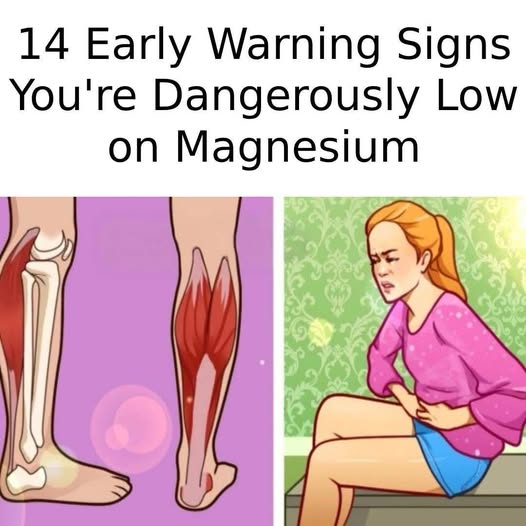⚠️ 14 Early Warning Signs You’re Dangerously Low on Magnesium
Magnesium is an essential mineral that supports over 300 enzymatic functions in the body — from muscle control to nerve function, energy production, and bone health.
But many people are deficient without even knowing it.

Here are the signs to watch for:
1. Muscle Cramps & Spasms
- Sudden leg cramps, eye twitching, or muscle stiffness may indicate low magnesium.
- Magnesium helps muscles relax after contraction.
2. Fatigue or Low Energy
- Magnesium plays a key role in producing ATP, your body’s energy molecule.
- Low levels = feeling drained, even after rest.
3. Trouble Sleeping (Insomnia)
- Magnesium calms the nervous system and supports deep, restful sleep.
- Deficiency can lead to tossing, turning, and difficulty falling asleep.
4. Anxiety, Nervousness, or Mood Swings
- Magnesium helps regulate neurotransmitters like serotonin and GABA.
- Low levels can cause increased anxiety, irritability, or even depression.
5. Abnormal Heart Rhythms (Arrhythmia)
- Magnesium supports proper heart rhythm.
- A deficiency may cause palpitations or irregular beats.
6. High Blood Pressure
- Magnesium helps relax blood vessels.
- Low levels can cause them to constrict, leading to elevated blood pressure.
7. Numbness or Tingling
- A lack of magnesium can affect nerve function, leading to pins and needles in hands, feet, or face.
8. Headaches or Migraines
- Magnesium deficiency can trigger blood vessel constriction, a common cause of migraines.
- Supplementing may help reduce frequency and intensity.
9. Osteoporosis or Weak Bones
- Magnesium supports bone health along with calcium and vitamin D.
- Deficiency may weaken bones over time, increasing fracture risk.
10. Constipation
- Magnesium helps relax muscles in the intestines and pull water into the bowels.
- Low levels can cause slow or difficult digestion.
11. Sugar Cravings
- If you often crave chocolate (rich in magnesium!), your body might be signaling a deficiency.
12. Frequent Muscle Injuries
- Sore, tight, or easily strained muscles may be a sign.
- Magnesium aids muscle recovery and reduces inflammation.
13. Poor Memory or Brain Fog
- Magnesium is critical for nerve transmission and cognitive function.
- Low levels may result in difficulty concentrating or remembering things.
14. PMS Symptoms (in Women)
- Cramping, bloating, and moodiness during periods can worsen with low magnesium.
- It helps regulate hormones and soothe muscles.
✅ How to Replenish Magnesium
🔸 Food Sources:
- Leafy greens (spinach, kale)
- Avocados
- Nuts (almonds, cashews)
- Seeds (pumpkin, chia)
- Whole grains
- Bananas
- Dark chocolate 🍫
🔸 Supplements:
- Magnesium glycinate (great for sleep & anxiety)
- Magnesium citrate (helps with digestion)
- Always check with a doctor before starting supplements!
🧠 Final Thought:
Don’t ignore the signs.
Magnesium deficiency is common — but it’s treatable.
Rebalancing your levels can transform your energy, mood, and overall health.